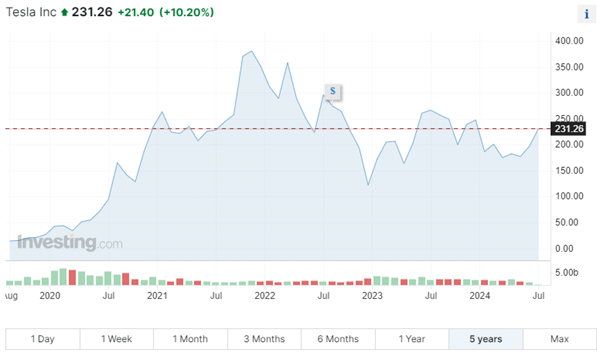When I am reflecting on Tesla's recent second-quarter results, it's clear that the electric vehicle (EV) pioneer continues to navigate an environment of fierce competition and declining demand. Despite the drop in deliveries, it managed to beat market expectations, which earned the stock a 10% increase in value and took it to a near six months high.*
Data that surprised
Tesla (NASDAQ: TSLA) delivered 443,956 vehicles in Q2 of this year, a slight decrease of 4.8% compared to last year, but a 14.8% increase quarter-over-quarter. This performance beat analysts' expectations, whose estimate was 438,019 deliveries. During this period, 422,405 Model 3 and Model Y units were delivered with 21,551 units of models like the Model S, Cybertruck and Model X, according to Reuters. This performance contributed to a 10% increase in its share price to $231.26, just under $10 off six months high.* The positive market reaction underscores investor confidence in Tesla's ability to manage cooling EV demand through tactical price adjustments and incentives.
Analysts, such as CFRA's Garrett Nelson, have pointed to the data as a reassuring sign, while others believe that Tesla is running out of strategies due to price adjustments.

Performance of Tesla´s stock over 5 years. Source: Investing.com
Competition is strong
Despite the better-than-expected figures, competitors pose big challenges for Tesla, especially in China. While Tesla has to adjust prices to maintain sales, competitors like BYD, Rivian or GM are gaining ground with more affordable models. According to Reuters, Chinese automakers saw sales double in the same period, with BYD reporting a 21% increase in battery EV sales to 426,039 vehicles and GM up 40%, for instance. Tesla did not disclose exact sales numbers in China, but according to their data released, sales in China, including exports outside the country, were down 17% year-over-year. In addition, automaker also facing headwinds in Europe, such as reduced electric vehicle subsidies and weak demand, which caused sales in that region to fall 36% during May alone.
Elon Musk's outlook
The company's May annual report gives a revised forecast for the number of deliveries by 2030, showing a cautious outlook and a departure from their ambitious targets. In the 1Q 2024 earnings, Elon Musk commented on the possibility of new models that should be more affordable and with the production of autonomous taxis to be revealed on August 8, 2024.
Conclusion
In conclusion, while Tesla's delivery data brings momentary relief to investors, the road ahead remains fraught with challenges. The company's ability to innovate and execute in the face of fierce competition and evolving market dynamics will be critical. As a trader, I remain optimistic about Tesla's long-term prospects, but I am also mindful of the volatility and uncertainty inherent in the electric vehicle sector. I will undoubtedly be keeping a close eye on upcoming developments, including the unveiling of robotaxi, as one of the key moments. [1]
* Past performance is no guarantee of future results
[1] Forward-looking statements are based on assumptions and current expectations, which may be inaccurate, or based on the current economic environment which is subject to change. Such statements are not guaranteeing of future performance. They involve risks and other uncertainties which are difficult to predict. Results could differ materially from those expressed or implied in any forward-looking statements.








